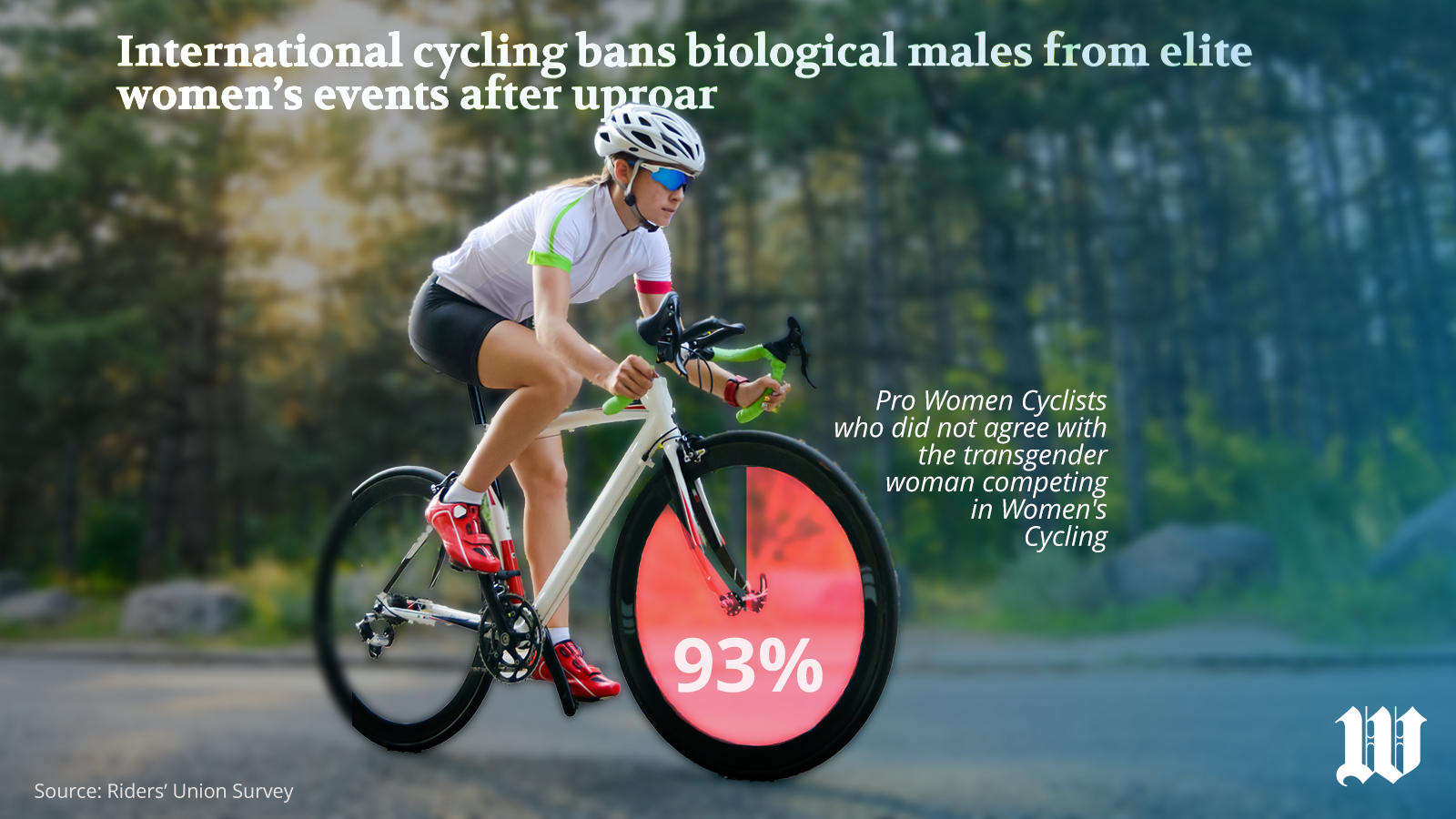The international cycling body has banned biological males who have undergone puberty from racing in female events, reversing the authority’s previous stance allowing athletes to compete based on gender identity after testosterone suppression.
The Swiss-based Union Cycliste Internationale announced Friday that its management committee agreed to change course at its July 5 meeting after hearing from scientific and legal experts as well as stakeholders on both sides of the issue.
“From now on, female transgender athletes who have transitioned after (male) puberty will be prohibited from participating in women’s events on the UCI International Calendar – in all categories – in the various disciplines,” said the UCI press release.
Under the new policy, the men’s category for international masters’ races will be renamed “Men/Open,” allowing participation by any athlete who fails to meet the restrictions for women’s competition. The revised rules take effect Monday.
The decision comes amid rising concern over the influx of male-born athletes who identify as female in cycling, an issue that came to a head in April when U.S. cyclist Austin Killips became the first biological male to win a UCI 2.2-registered stage cycling race, the Tour of the Gila in New Mexico.
The 27-year-old Killips had followed the previous policy, which required male-born cyclists to keep their testosterone in serum below 2.5 nmol/L for at least two years, but the committee said the research “does not confirm” that the level is sufficient to “completely eliminate the benefits of testosterone during puberty in men.”
“Given the current state of scientific knowledge, it is also impossible to rule out the possibility that biomechanical factors such as the shape and arrangement of the bones in their limbs may constitute a lasting advantage for female transgender athletes,” said the UCI.
UCI President David Lappartient emphasized that cycling “is open to everyone, including transgender people, whom we encourage like everyone else to take part in our sport,” but that the governing body “has a duty to guarantee, above all, equal opportunities for all competitors in cycling competitions.”
“It is this imperative that led the UCI to conclude that, given the current state of scientific knowledge does not guarantee such equality of opportunity between transgender female athletes and cisgender female participants, it was not possible, as a precautionary measure, to authorize the former to race in the female categories,” he said.
The move follows British Cycling’s decision in May to redo its categories, replacing the men’s division with an “open” division and the female category for biological women, as well as women who identify as men but have not undergone hormone therapy.
Other sports governing bodies, including World Athletics and the International Swimming Federation [FINA] have moved recently to restrict participation by male-to-female athletes in women’s elite sports.
Those urging UCI and USA Cycling to change its policies include the Independent Women’s Forum, which held protests last month and circulated a petition to “keep women’s cycling female.”
“I am enormously pleased to see the UCI has chosen fairness for women athletes,” said 10-time U.S. national champion cyclist Inga Thompson. “93% of the Pro Women Cyclists did not agree with the transgender woman competing in Women’s Cycling. The UCI listened to their women and listened to the current science. Bravo to the UCI.”

The Independent Council on Women’s Sports said that UCI is “moving in the right direction,” but that “puberty is not the divide between man and woman. It is the divide between boy and man OR girl and woman.”
“Female athletes deserve fair competition at every age and every level,” said the council.
Advocates for transgender athletes in female sports have argued that “trans women are women” and should be allowed to compete based on gender identity in the name of inclusion.
Killips dismissed concerns last month about transgender athletes in women’s elite sports, telling the Knoxville [Tennessee] News Sentinel that “we’re statistically underrepresented.”
Former NCAA 12-time All-American Riley Gaines said that “UCI has joined the likes of FINA and World Athletics and prioritized fairness in sport rather than feelings.”
“Cycling has been heavily infiltrated with males competing in the women’s division so this is huge,” said Gaines, an IWF advisor.
• Valerie Richardson can be reached at vrichardson@washingtontimes.com.



Please read our comment policy before commenting.